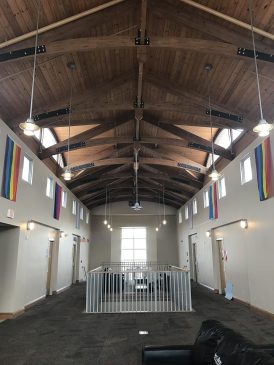
It’s basic feng shui: one’s space can directly impact the way that one feels. This sentiment holds true on campus, as students who involve themselves with Living Learning Communities (LLCs) are far less likely to transfer than those who do not. Not only do Living Learning Communities offer accepting spaces of discourse, but also various activities, events and communication networks with both professors and other students.
LLCs are not unique to New College – in fact, it’s difficult to find a college or university that doesn’t offer these living spaces. The popularity of LLCs most likely relates with the positive results that they bring to student life. Research from multiple higher education institutions indicate that participation in these housing communities has a strong correlation with self-reported student satisfaction with college.
So why are LLCs so beneficial to student life?
“The concept of the living learning community is structured around a cohort of students linked together by specific courses focusing on an overall academic and/or interest-based theme in collaboration with a residential component,” Senior Associate Dean of Student Affairs Mark Stier said. “These experiences purposefully integrate in-classroom and out-of-classroom activities to provide heightened learning opportunities designed to increase the overall scholastic and involvement levels of participants.”
Thus, by providing a space in which students are offered various interest-related opportunities and encouraged to communicate with one another regularly, LLCs help strengthen individual connections with their college or university. This is particularly important for New College, as almost 20 percent of students transfer to other institutions after their first year here.
“I think LLCs were originally founded to enhance academic experience, but if you look at most national statistics and institutional research, it will show you that LLCs increase academic performance and success and those participants have a stronger retention rate and tie to the institution they’re attending,” Stier said. “The more you like where you live, the less you will want to leave.”
There are currently six LLCs on campus: LGBTQ+, Wellness, Global Village, Quiet Dorm, SuccessQuest and Culinary. These communities change greatly over time depending on campus-wide interest. Some of the new LLCs recently proposed by students include Environmental, Outdoor Survival, Spirituality, and Music Performance/Art.
Because LLCs have proven to be so beneficial to student retention, they get preselection for housing. This means that LLC sponsors are able to sit down with faculty members, look at the layouts and architectural floor plans of each building and then determine which space is best fit for the community in mind.
“Some communities will only have four people, so they could be a Dort or Gold apartment, and that could be a learning living community. Or they could be larger and use a whole building,” Stier said.
In addition, housing purposely sets aside additional spots in LLCs for first-year students. For example, if a LLC has 12 people registered, housing will “carve out additional space so that first-year students have the opportunity to participate in these programs also,” Stier said.
For second-year LGBTQ+ LLC Residential Advisor (RA) Ethan Kennedy, having a safe, communal space that fostered more inclusion and community interactions was both important and necessary.
“As someone who is gender nonconforming, I was in the gendered Pei housing last year and I was like, I want to create something where trans and non-conforming students can live and have gender pronoun preferences taken into account with roommates and not be in that uncomfortable gendered housing dynamic that first-years experience,” Kennedy said.
But how does one create a LLC?
“Any student can create an LLC. All they have to do is come see me and present a proposal, and that proposal consists of how it improves the community, what the benefits are, they have to have a faculty or staff mentor – ideally a faculty member, because it’s supposed to be a collaborative venture between academics, but it doesn’t have to be academic,” Stier said.
The success of a LLC completely depends on the participation and commitment of its residents. The amount of time and labor invested in these LLCs is reflected in how each community functions.
“You get out what you put in,” Kennedy said.
Some communities have been laid back in their approach, while others place heavy emphasis on programs, activities, engagement and interaction.
“Part of the reason why I work so hard is because I’m seeing the positive output from this thing; I’m seeing every day how it’s doing good,” Kennedy said.
“What I really like about the LLCs is that you’re all drawn in by that one similar thing but each person has their different diverse perspective and background, so it makes the community really multi-spectrum.”
Living Learning Communities are a great way to help students pursue their interests while also providing inclusive spaces, discussions and opportunities.
Information taken from:
www.nsse.indiana.edu, www.ncf.edu

